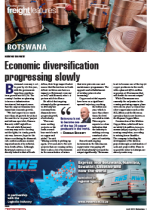The advancement of Botswana's railway infrastructure is a critical factor in unlocking the country's potential for economic growth and increasing its competitiveness in international trade.With limited access to ports and heavy reliance on road transportation, high costs and delays associated with this mode of transport have hindered the country's competitiveness in regional and global markets.As a result, the government has for years been prioritising the development of its railway infrastructure to enhance efficiency, reduce costs, and stimulate trade and investment. However, the country's plans to expand and upgrade its railway network have been slow, as its initial plans were largely linked to its massive coal resources that are increasingly being seen as stranded.Botswana possesses a significant reserve of two billion tons of coal, yet the challenge of getting it to international markets has been a persistent issue. The most viable option for transporting the coal is through railway infrastructure, but the government has encountered difficulties in securing financing for such projects. International investors' aversion to fossil fuels, including funding for railway lines, has left the Botswana government in a difficult position, facing a dilemma that must be addressed.According to Duncan Bonnett, a partner at Africa House, the country faces challenges in developing a railway line to Namibia, as well as to South Africa and Mozambique.“The proposed construction of a railway line along the Trans Kalahari from Botswana to the Port of Walvis Bay is a mammoth $9-billion project. However, the project's funding prospects appear bleak, given the anticipated backlash over coal transportation. Moreover, the project's success hinges on the availability of long-term off-takers for the product, which is currently non-existent. As such, the development of this project faces significant challenges that must be overcome before it can become a viable option for the transportation of coal and other goods.”He said moving the coal via Zimbabwe through to Mozambique was just as problematic, with such a project just as costly, but also considered to be technically difficult.“Although exporting via Mozambique could see the country utilising existing rail infrastructure, significant upgrades to the existing rail lines in Botswana, Zimbabwe and Mozambique, as well as constructing a new port, would be necessary. Additionally, a key issue is the incentive for Zimbabwe and Mozambique to facilitate the export of Botswana coal, given that they have their coal to export and market.”If Botswana were to transport its coal through South Africa, it would face direct competition with the country's coal industry, making this option just as challenging. According to a spokesman for Transnet Freight Rail (TFR), TFR and Botswana Rail have signed a Joint Development Agreement for the construction of a rail line from Mmamabula in Botswana to Lephalale in South Africa. “Work is currently being undertaken on a bankable feasibility study.”Despite reports indicating that both entities would work together to fix parts of the 12 -kilometre rail line between Swartruggens and Mafikeng, the spokesman said to date no project had yet been established between TFR and Botswana Rail to do so.Bonnett said while there may be a current surge in demand for coal due to the ongoing war in Ukraine, demand for coal would again wane in future.

